Morocco Chess Week kicks off in Casablanca
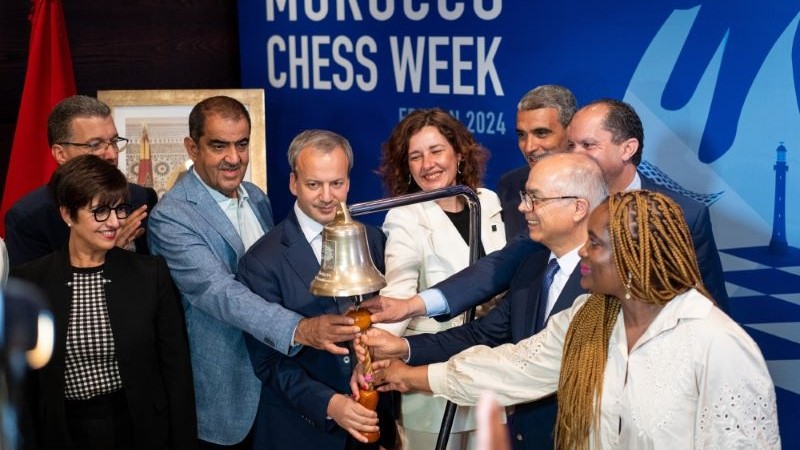
The 2024 edition of Morocco Chess Week started in Casablanca with the official Opening Ceremony at the Casablanca Stock Exchange. The event is held under the High Patronage of His Majesty King Mohammed VI. Since its launch in 2021, initiated by Casablanca Events & Animation and the Casablanca Stock Exchange, this festival has grown to an international scale. The 3rd edition of the festival is organized in partnership with the Royal Moroccan Chess Federation. The main attraction is the Casablanca Chess Tournament, featuring Magnus Carlsen, Hikaru Nakamura, Viswanathan Anand, and Amin Bassem. They will try out the novel “Casablanca chess variant” designed to celebrate the history of chess. The grandmasters will start their rapid games from positions derived from historical games carefully selected by GMs Hicham Hamdouchi and Laurent Fressinet. The idea of this innovative format was suggested by Tarik Senhaji, CEO of Casablanca Stock Exchange. This tournament promises a unique experience, honoring the rich history of the game. The games start on May 18 at 16:15 local time. Live Broadcast: Casablanca Chess 2024 – Chess.com The Opening Ceremony began with a speech by Mr Tarik Senhaji, CEO of the Casablanca Stock Exchange. He said: “This festival, from the start, has been more than just a competition for us organizers; it has been a celebration of the spirit of chess. It is about learning, sharing, and growing together as a community. It is about fostering the values of chess for the wider community and fulfilling our social values for us at Bourse de Casablanca and also our partners.” Mr Chakib Benmoussa, Minister of National Education, Preschool Learning and Sports, took the stage next. He emphasized that chess is not only a sport and a cultural phenomenon but also a great educational tool. This year marks the centenary of the International Chess Federation, and Casablanca has been selected as the African city for the festivities. This celebration will feature the Chess Olympiad Torch Relay, which travels around the world leading up to Budapest, where the Chess Olympiad will be held in September. On this occasion, a significant event will be organized at the Parc de la Ligue Arabe with several enriching activities for the general public, including a simultaneous exhibition with 100 players. Arkady Dvorkovich, FIDE President, said in his speech: “It’s not just an event, it’s one of the central elements of our 100-year anniversary celebration this year. We are looking at our history. We started in India, where most likely chess was born, we went to Switzerland, where for many years FIDE headquarters has been located, and now we are in Morocco from where most likely chess came to Europe. It’s about our roots.” On the occasion of FIDE anniversary, FIDE President awarded the FIDE Medal of Merit to Mr Chakib Benmoussa, recognizing his contribution to the development of chess in the region. The Opening Ceremony speeches continued with addresses from Mrs Tshepiso Lopang, President of the African Chess Confederation, Mr Mohamed Jouahri, CEO of Casablanca Events and Animation, and Mrs Bouchra Kadiri, President of the Provisional Committee in charge of the Moroccan Royal Chess Federation. In the end, the distinguished guests rang the ceremonial bell, officially opening the Morocco Chess Week 2024. Replay of the Opening Ceremony livestream: YouTubePhotos (please attribute the photographer when using): DropboxLive Broadcast: Casablanca Chess 2024 – Chess.comOfficial Website: Casablanca-Chess Written by Anna Burtasova, Casablanca Chess Press Officer Photos by Lennart Ootes
Freedom Holding Corp. to Be Title Sponsor of Landmark Chess Event in New York City

Bringing the Brightest Stars in Chess from the Global Business Community Together for an Ultimate Chess Challenge Freedom Holding Corp. (NASDAQ: FRHC), a multi-national diversified financial services holding company, today announced its participation as a competitor and as the title sponsor of the landmark chess event, the 2024 FIDE World Corporate Chess Championship. Hosted by the International Chess Federation (FIDE), this three-day championship event will showcase the brightest stars in business and some of the biggest names in chess. Since the beginning of March, registered corporate teams have been competing online to qualify to participate in this elite battle for the title of Smartest Company in the World. And for the first time since the pandemic, the tournament will be an in-person, over-the-board experience, held from June 15 -17, 2024, in the heart of New York City’s financial district in the historic Cunard building. The Smartest Companies Know… “The game of chess knows no borders and sets aside all politics,” said Timur Turlov, Freedom Holding Corp.’s Chairman and Chief Executive Officer. “Success in chess, like business, comes from thoughtful deliberation and strategic positioning. This partnership is a true reflection of Freedom and our approach to business – well-researched, collaborative, and intentional. We are delighted to be competing in, as well as being the presenting sponsor of, the FIDE World Corporate Chess Championship. We’ve invited leaders in business from across the globe to join the challenge,” the CEO noted. 100 Years of Making Chess History… Arkady Dvorkovich, president of FIDE, commented, “This year marks the 100th anniversary of FIDE; our organization has a longstanding, rich history of building community and fostering growth and camaraderie among players and across continents. Hosting this event in partnership with the Freedom Holding Corp. team is the perfect way to mark this momentous celebration. A world-class event, presented by a world-class leader in business, at a world-class location, to continue supporting global unity through a common language and passion for chess.” Sponsorship: Make the Right Move for Your Organization… Registration to compete has now closed. However, sponsorship opportunities remain available. VIP packages will include global brand awareness campaigns, meet and greet opportunities with the elite of chess and business, and so much more. For more information about sponsorships please contact, Ekaterina.Mashina@FIDE.com. Get Your Tickets Now… The countdown is on, and space is limited. Tickets go on sale May 20, 2024, at 12:00 p.m. ET, at freedomcapmkts.com/chess About Freedom Holding Corp. Freedom Holding Corp. is a diversified financial services holding company conducting retail securities brokerage, securities dealing, market making, investment research, investment counseling, investment banking and underwriting services, consumer banking, insurance and several ancillary businesses which complement its core financial services businesses, through its subsidiaries, under the name Freedom Finance in Europe and Central Asia, and Freedom Capital Markets in the United States. Through its subsidiaries, Freedom Holding Corp. employs more than 6,000 people and is a professional participant in the Kazakhstan Stock Exchange, the Astana International Exchange, the Republican Stock Exchange of Tashkent, and the Uzbek Republican Currency Exchange and is a member of the New York Stock Exchange and the Nasdaq Stock Exchange. Freedom Holding Corp. is headquartered in Almaty, Kazakhstan, and has operations and subsidiaries in 19 countries, including Kazakhstan, the United States, Cyprus, Poland, Spain, Uzbekistan, and Azerbaijan, among others. Freedom Holding Corp.’s common shares are registered with the United States Securities and Exchange Commission and are traded under the symbol FRHC on the Nasdaq Capital Market, operated by Nasdaq, Inc. To learn more about Freedom Holding Corp., visit freedomholdingcorp.com About FIDE The International Chess Federation (FIDE) is the governing body of the sport of chess, and it regulates all international chess competitions. Constituted as a non-governmental institution, it was recognized by the International Olympic Committee as a Global Sporting Organization in 1999. FIDE currently has its headquarters in Lausanne, but it was initially founded in 1924 in Paris under the motto “Gens una Sumus” (Latin for “We are one Family”). It was one of the very first International Sports Federations, alongside the governing bodies of the sports of football, cricket, swimming, and auto racing. It is now one of the largest, encompassing 201 countries as affiliate members, in the form of National Chess Federations. Chess is nowadays a truly global sport, with dozens of millions of players in all the continents, and more than 60 million games on average played every day.
Guinness World Records Attempt: Registration of tournaments open
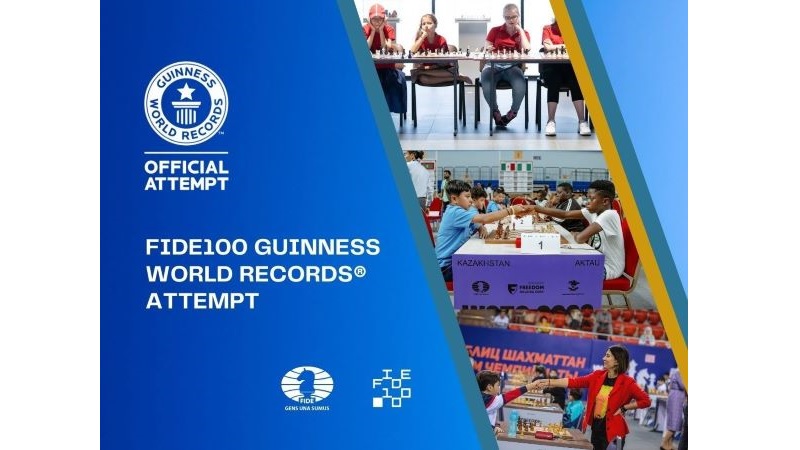
On July 20, 2024, the International Chess Day, FIDE celebrates its centenary anniversary. To mark this date, we aim to set the Guinness World Record for the most chess games played within 24 hours, both online and over-the-board. FIDE invites federations, chess organizers and clubs to join the attempt and help us set a new milestone for the chess world! Be a part of the biggest chess day of all time! You can participate in the Guinness World Records attempt from any corner of the globe. Requirements for tournaments to join the Guinness World Records Attempt: 1. To be eligible, tournaments must meet to the following criteria: Held between July 20, 2024 00:00:00 CEST and July 21, 2024 00:00:00 CEST; a single round of a several day event, played on July 20, is also compliant with the attempt; Supervised by a FIDE licensed arbiter; Registered on the official website of the Guinness World Records Attempt before July 15; Eligible formats: OTB: Swiss system, round-robin, or simultaneous display tournament; Online: Swiss system or round-robin tournaments, arena or individual ‘online rated’ games, with a minimum number of 15 moves. 2. Game requirements are the following: Games must adhere to the Laws of Chess with specific time controls and formats; Minimum 3 min. + 2 sec. increment per move, starting from move 1 (for games with increment) or 5 min. per game (for games without increment); Maximum duration: 8 hours; All games need to start and finish within the designated 24 hours to count. 3. Submitting Results: The event supervisor/FIDE licensed arbiter needs to confirm the number of games played, provide to FIDE a standard TRF file and sign a protocol confirming the number of games played; The registration of the tournaments participating in the GUINNESS WORLD RECORDS Attempt is available via the official FIDE Guinness World Record Attempt page. Registration deadline: July 15, 2024 About the Guinness World Records Guinness World Records, originally known as the Guinness Book of Records, has emerged as the definitive authority on record-breaking achievements, stemming from the idea of resolving disputes in pubs with a book of facts. Today, it stands as a global brand, with offices spanning London, New York, Beijing, Tokyo, and Dubai, alongside a network of brand ambassadors worldwide. Its mission extends beyond the pages of its iconic book, now encompassing TV shows, social media, and live events, all aimed at documenting the extraordinary.
FIDE International Chess Day Art Contest announced

The International Chess Federation (FIDE) is thrilled to announce an exciting art contest dedicated to celebrating International Chess Day on July 20. This year, in conjunction with the festivities, we are aiming to set a Guinness World Record attempt for the most chess games played within 24 hours, both online and over the board, with licensed arbiters present. To commemorate this historic event, we invite artists from around the globe to participate in our art contest by creating captivating posters that inspire communities to join us in this remarkable celebration of chess. As we are celebrating the Centenary of the International Chess Federation this year, we are also inviting creative works with the theme “FIDE 100”. Contest Categories: AI Artwork: This category is open to submissions created using artificial intelligence (AI) tools or algorithms. Traditional Artwork: This category is open to submissions created by traditional means, such as drawing or painting. Theme 1: Artwork submissions should focus on promoting and encouraging communities to participate in the Guinness World Record attempt for the most chess games played within 24 hours, emphasizing the excitement and universality of chess as a game that brings people together. Theme 2: Artworks should be created to reflect some of the important chess events that happened in the last 100 years. The artist must reflect on FIDE’s influence in the shaping of the world of chess since 1924. Regulations: Eligibility: The contest is open to artists of all ages and skill levels worldwide. Participants may enter in one or both categories. All submissions must be original works created specifically for this contest. Submission Guidelines: The artwork resolution should be at least 5 megapixels, ideally around 15 megapixels, and the file size should be less than 5MB. Submissions must be in raster image file format (JPEG, PNG, GIF, TIFF) For the Traditional Artwork category, Submissions must be scanned or photographed and submitted in the image file format described above. Each participant may submit only one entry per category. Content Guidelines: Designs should be visually striking and easily understandable, with a clear message encouraging participation. Any text included in the artwork must be in English. Theme 1: The artwork should incorporate the contest theme and prominently feature the date (July 20th) and the event details. Submission Process: Participants must submit their entries via 100.fide.com/fide-international-chess-day-art-contest/ and fill in the application form there. Deadline: The deadline for submissions is July 10th. Judging Criteria: Creativity and originality; Relevance to the theme; Visual impact and aesthetics; Overall composition and design. Prizes: Winners will be announced during the Chess Olympiad in Budapest. Winners will receive a special appreciation certificate from FIDE President; Cash prizes will be awarded for the three best artworks. 1st place: €800, 2nd place: €500, 3rd place:€300. Winning artworks will be printed and displayed at the Olympiad venue. By participating in this contest, artists grant FIDE the right to reproduce, distribute, and display their artwork for promotional purposes related to the International Chess Day celebration, the Guinness World Record attempt, and the FIDE 100 Centenary. Join us in commemorating International Chess Day and FIDE 100 Centenary in style and helping us make history in the world of chess! We look forward to seeing your creative interpretations of this momentous occasion.
Back to the Future with Casablanca Chess!
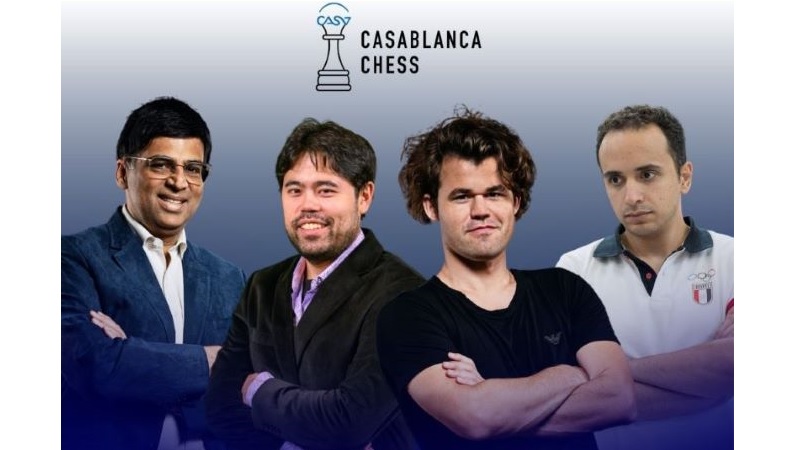
By GM Hicham Hamdouchi and GM Laurent Fressinet This weekend, the grand chess spectacle will begin in Morocco. Four top grandmasters – Carlsen, Nakamura, Anand, and Amin – will test the new Casablanca Chess Variant, introduced by the Casablanca Stock Exchange. They will start their rapid games from carefully selected positions derived from historical games. The idea of this innovative format was suggested by Tarik Senhaji, CEO of Casablanca Stock Exchange. The schedule will be as follows (all times are local): Saturday, May 18 Round 1 at 4:15 pm / Carlsen vs Anand & Nakamura vs AminRound 2 at 5:30 pm / Amin vs Carlsen & Anand vs NakamuraRound 3 at 6:45 pm / Nakamura vs Carlsen & Amin vs Anand Sunday, May 19 Round 4 at 7:15 pm / Anand vs Carlsen & Amin vs NakamuraRound 5 at 8:30 pm / Carlsen vs Amin & Nakamura vs AnandRound 6 at 9:45 pm / Carlsen vs Nakamura & Anand vs Amin The event will be broadcast live on chess.com. Each round will be preceded by a 15-minute segment dedicated to the selection of the position, either with a guest or via online polls. At the beginning of each round, the players will receive the scoresheets of the chosen position. They will have two minutes to play through the historical game on the board up to the position from which their game will commence. Subsequently, the arbiter will initiate the clocks. The time control will be 15 minutes with a 10-second increment. No draw offers will be permitted. Context There have already been themed tournaments in history, for example, starting with a position from the Buenos Aires or Najdorf variation. Alternative formats have been attempted, such as Bobby Fischer’s Chess960, Anti Chess, Crazy House, or even No Castling in Dortmund (where castling is prohibited). The objective is always the same: to break away from the well-trodden path and offer new horizons to players. Among these, only Chess960 resembles “real chess” in terms of traditional rules and enjoys relative success. The most recent experience to date was the Weissenhaus tournament in Germany, which brought together the world’s top players at classical time controls. It saw Carlsen’s victory. Unanimously, the invited top GMs were delighted with this format. It is true that Chess960 allows for more creativity. Players find themselves immediately in unfamiliar territory and try, not without difficulty, to fall back on classic and familiar patterns. The Casablanca Variant Now, let’s delve into the technical aspects of the Casablanca Variant. The idea is quite different. We stay within the realm of classical chess. Players are given a position from a game that has already been played (or could also be imagined). However, this position must meet several well-defined criteria. First and foremost, the evaluation should be roughly equal (around 0.00, according to engines). The position must be taken from the opening, somewhere between the 6th and 15th moves (although mainly between the 10th and 12th). Most importantly, and this is the most crucial criterion, it must offer rich possibilities for both players. As you may have guessed, the main idea is to have exciting games or, at the very least, encourage the participants to produce them. We will have the opportunity and privilege of having a royal line-up to test this idea (Magnus Carlsen, Hikaru Nakamura, Viswanathan Anand, and Bassem Amin). The positions will be carefully chosen by us (GM Hicham Hamdouchi and GM Laurent Fressinet). The event coincides with the centenary celebrations of FIDE. To further engage the audience, each position will be chosen from a historically significant game. Let’s look at a concrete example: Will Magnus Carlsen choose 14…Rc8? This game was played between Nona Gaprindashvili and Maia Chiburdanidze during their Women’s World Championship match in 1978. It is the 14th round, and the position arises from a Caro-Kann defence after the White’s fourteenth move 14.Rh4. The analysis module sanctions it with an even evaluation 0.00. The most played moves for Black in the database are in the following order: 14…Be7, 14…Rc8, 14…cxd4, and 14…0-0-0. Which strategy to choose? We can easily deduce that the position is rich in possibilities for both sides. We can see the potential opposite-side castling, a white pawn majority on the queenside, as well as other likely imbalances depending on the chosen plan by both sides. In the actual game, Maia chose 14…Rc8. The players quickly transitioned into an endgame in which Black missed a win, settling for a draw on the move 52. One game later, Maia Chiburdanidze was crowned world champion! No preparation possible, unless… It is in this state of mind that we have chosen a total of 18 positions (6×3=18). Before the start of every round, the position players will face off and will be picked out of possible three. After each game, it will be interesting to test the memory and encyclopaedic knowledge of our champions to see if they have managed to place the games: who played them, and when? We hope to witness a grand spectacle despite starting positions presumed to be “equal”. However, rephrasing a well-known expression: all positions are equal, but some are more equal than others!
8th YCCC: Inspiring the next generation of chess composers
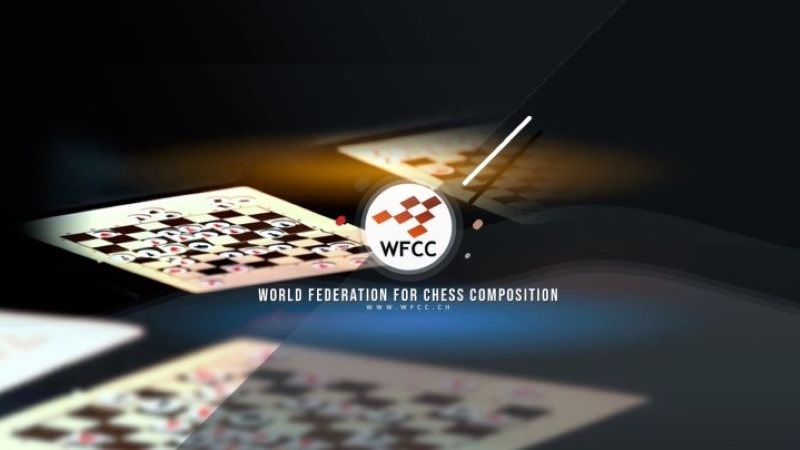
The 8th Youth Chess Composing Challenge is on the way! The youngest contributors to chess art (born 2001 and younger) were offered three different sections to inspire their creations till June 10, with five special prizes of 500 Euros vouchers each for the best representatives of the five most successful countries. The vouchers donated by the Fujairah government will be used for development of young talents, helping them to take part in the main WFCC events 2025: World Congress of Chess Composition, World Chess Solving Championship or European Chess Solving Championship. The results of the 8th YCCC will be announced on August 2, 2024, at the closing ceremony of the World Congress of Chess Composition in Jurmala. The tradition of YCCC was established in 2016 to stimulate young minds and to mentor their work. In 2024 not less than 12 well known experts in the field (FIDE grandmasters, international masters and masters of chess composition) will be engaged to comment and evaluate creations of young participants from all around the world. There are three sections: one with the set thematic condition, and two without any restrictions. The Section A is for original problems in 2 moves, with three adjacent black pawns in the same rank and the black King at least three ranks below them. In the solution, each black pawn should move and allow a different mate by White. Why was this unusual condition proposed? The primary goal is to invent something original, as a composer has to avoid repeating the same or very similar content his predecessors have created over more than 170 years of development of the orthodox #2. Searching through the databases is difficult, even for experienced composers. That’s why a very rarely explored pattern was selected. To find such a pattern the Albrecht collection was used. The largest database for two-movers was founded by the late Herman Albrecht (on paper cards) and later extended by Hans-Dieter Leiss to classify around 85.000 #2s. Next, the huge voluntary work was done by the GM Composer Udo Degener to make the collection almost three times bigger, to digitalize it and make it a free online database! At the moment, the Albrecht collection with almost 300,000 #2s by more than 15,000 composers, contains only five examples of the YCCC-8 thematic condition. All of them are presented and explained in the 8th YCCC Announcement, so there is plenty of room for originality. The five discovered examples present only three different locations of the black King (in relation to the pawns) out of 28 possible ones. It means that any presentation of the theme in remaining 25 matrices may be treated as a new record! The main task for young composers will be to present maximal activity of black pawns (three variations with different mates in the solution are thematic minimum). When the numbers of variations are approximately equal, the tireless YCCC Judge David Shire will value other artistic and constructive features. We present here one of the five examples, showing an unusual artistic approach. The author wanted and managed to present the pawns-only play. The 1st move of White, the threat, the defences and mates are all executed by pawns! №1 Albert Servais Problem 1954 (v) Mate in 2 moves There is an eternal discussion if composing chess problems helps improving skills in any other activity. First of all, it improves solving skills to help better understand the internal structure of chess problems. Ural Khasanov (pictured below, born 2006) is currently the 4th solver in the world and the youngest one among the Top 40. His meteoric rise began in 2021, together with his first big successes in YCCC. Photo: Fujairah Chess & Culture Club The thematic condition in the Section A of the 5th YCCC was to have all four Bishops in the corners in the initial position, and to use them in an intensive and interesting way. Ural managed to present four thematic tries activating all four Bishops. More than that, all four threats from the try play reappear as mates in the solution: №2 Ural Khasanov, 1st Place YCCC-5 Section A, 2021 Mate in 2 moves Later on, this #2 was included into the FIDE Album 2019-21, where the best compositions in 3-years cycles were selected. Getting into FIDE Album at the age of 15 is an historical achievement, but it didn’t break the record. For three years this record was held by the author of another YCCC success: №3 Ilija Serafimović, 1st Place YCCC-3 Section B, 2018 White to play and draw In 2018 the endgame section of the 3rd YCCC asked for original endgames presenting sacrifice of white Queen (without capturing). The winning entry included two such sacrifices into interesting play of both sides, and rewarded the 14-years author Ilija Serafimović (pictured below, born 2004) with his first FIDE Album entry! Photo: Fujairah Chess & Culture Club Ilija is the most successful participant of the previous seven YCCCs. His starting interest was composing, but from 2018 on he understood he could solve very well, and is now among the best junior solvers in the world. In fact, the best solvers among juniors show the same tendency: 8 out of the Top 10, lead by the reigning World champion Danila Pavlov (pictured below) have got a composing experience in YCCC. Photo: Fujairah Chess & Culture Club Are there composers among the young chess grandmasters? You might have heard Rameshbabu Praggnanandhaa quoting Oleg Pervakov, the multiple world champion in composing endgames, to be his favourite chess writer, but you probably didn’t know Pragg was also composing helpmates. His compatriot GM Karthikeyan Murali, known for fierce attacks, was taking part in YCCC too, again with helpmates. In general, Indian chess prodigies have wider chess composition culture than the younger generations from other countries. Photo: Eric Rosen And, who is currently the youngest chess composer ever to get in the FIDE Album book? In the year 2019, at the time of becoming the youngest (at that time) International Master in the history of American chess, the current Grandmaster Christopher Woojin Yoo (pictured above, born 19th December 2006) broke another record. He was 12 years and 7 months at the time of sending
Updated FIDE (Dutch) System Effective from July 1, 2025

The SPP Department of the Technical Commission is pleased to announce the approved updates to the C.04.3 FIDE (Dutch) System (handbook.fide.com/chapter/C0403202507). These amendments aim to simplify and enhance the end-of-round pairing process and introduce various types of Pairing Allocated Byes (PABs). Key changes include streamlining the pairing process, excluding players with fewer games from PAB candidacy, and exploring different solutions for PAB in the early rounds, such as half-point, virtual, and zero-point PABs, as well as other variable PAB solutions and considerations for full-point byes. The update draws on insights from the current FIDE (Dutch) System and the new Dubov System, indicating that some existing rules could be simplified for clarity, while a more comprehensive review could necessitate a new pairing system. We also want to draw your attention to C.04.2 General handling rules for Swiss Tournaments, C.04.4 Other FIDE-approved Pairing Systems, and C.04.5 FIDE-approved Accelerated Systems, which contain the documentation with the new references used in C.04.3 FIDE (Dutch) System. We extend our sincere appreciation to Mr. Roberto Ricca and the entire SPP Department for their dedicated efforts in refining the tie-break rules and their explanations. For any inquiries or further information, please contact Hendrik du Toit at secretary.tec@fide.com.
Baku Open 2024 announced

The Ministry of Youth & Sport of the Republic of Azerbaijan and the Azerbaijan Chess Federation are pleased to announce the Baku Open – 2024 Chess Festival dedicated to the 100th anniversary of FIDE. The festival will be held from June 28 (arrival day) to July 07 (last round and closing ceremony) in Baku Sport Hall. The program of the festival includes competitions in two sections (A and B), 9-round Swiss tournaments with classical time control. Group A is open to players with FIDE Elo above 2100 (Women – above 1800), Group B is open for young players with FIDE Elo and born in 2012 and later. Photo: Baku Sports Hall Facebook The total prize fund of the tournament amounts to USD 50,000, with USD 12,000 reserved for the winner of Section A. The first ten registered players with FIDE Elo above 2650 (as of June 1, 2024) and women with FIDE Elo above 2450 (as of June 1, 2024) will be provided with a full board. Schedule: Date Time Event Group B Group A 29 June 14:30 Opening ceremony 29 June 10:00 15:00 1st round 30 June 10:00 15:00 2nd round 01 July 10:00 15:00 3rd round 02 July 10:00 15:00 4th round 03 July 10:00 15:00 5th round 04 July 10:00 15:00 6th round 05 July 10:00 15:00 7th round 06 July 10:00 15:00 8th round 07 July 10:00 15:00 9th round 07 July 20:00 Closing ceremony Photo: thediaryofanomad.com/ The capital of Azerbaijan has a lot to offer besides chess. The guests of this open-minded and hospitable city are welcome to stroll along the Caspian promenade, visit the Old City and enjoy the unique blend of ancient and new. Regulations for International Chess Festival Baku Open 2024 (PDF) Contacts:Azerbaijan Chess FederationЕ-mail: azerbaijanchess@yahoo.comWebsite: http://asf.org.az
Superbet Poland Rapid & Blitz: Magnus Carlsen captures title

Magnus Carlsen emerged as the winner of the 2024 Superbet Poland Rapid & Blitz. The World #1 became the leader of the Grand Chess Tour 2024 season and took home $40,000 first prize. Day 5 of the competition saw the thrilling finale in the race between tournament leader Wei Yi and World #1 Magnus Carlsen. Going into the final day, Wei was leading the tournament 2.5 points ahead of Magnus. The Chinese GM started well, beating Gukesh D in Round 10 of the blitz. Carlsen kept pace, taking over Kirill Shevchenko with Black in a very complicated game in which the young Romanian player had a dangerous attack. Kirill Shevchenko – Magnus Carlsen White has more than sufficient compensation for the sacrificed bishop. The best way to proceed suggested by the computer was 16. Rd2, gradually building up the pressure along the d-file. Kirill played seemingly logical 16. f4? opening the lines which turned out to be a serious mistake. After precise 16… Rb8! 17. Qh4 Qe3+ 18. Kb1 Qxf4 19. Qh6 Ng4 20. Nf5+ Qxf5 21. Qxf8+ Nxf8 Magnus repelled all the treats and emerged up a piece in an endgame. | 0-1, 23 moves. Wei Yi was completely lost against Keymer in the next round but got a lucky break after the young German blundered a stalemate combination. Vincent Keymer – Wei Yi After 70. Qf8+ Kh7 71. Qf5+ White forces a winning pawn endgame. Vincent, however, played the natural 70. c4?? completely missing 70…Qh2+! The queen is taboo because of the stalemate. Keymer tried 71. Kf1, but Black insisted on sacrificing the queen and after 71…Qg1+ 72. Ke2 Qe1+! a draw was agreed ½: ½. Carlsen, meanwhile, won a nice game against Praggnanandhaa, making good use of his two bishops and narrowing the gap with Wei Yi. In Round 12, the Chinese GM blundered a simple intermezzo against Jan-Krzysztof Duda, which cost him a minor piece and the game. Magnus, on the other hand, continued his winning streak, defeating Nodirbek Abdusattorov and shortening the distance to the leader. It set up a critical leaders’ clash in the next round. Magnus prevailed in a very long battle to catch up with Wei in the standings. Wei Yi bounced back in Round 14, converting his extra exchange against Anish Giri, but it was not enough to pull away as Magnus won his game against Vincent Keymer. Vincent Keymer – Magnus Carlsen Magnus has just played 57…Ke6? (the immediate 57…a2 was much better) offering White an excellent chance to escape for a draw with 58. h4! Vincent missed this opportunity and played 58. Ra6+ instead, but after 58…Kd5 59. Kg2 e6 Carlsen seamlessly converted his extra pawn. | 0-1, 82 moves Wei got lucky in the next round winning the game against Arjun Erigaisi after the Indian went for a tempting but erroneous combination. Arjun Erigaisi – Wei Yi In this position with an extra pawn, White miscalculated and sacrificed his queen with 32. Qxa8+?? However, after the precise 32… Rxa8 33. Rc8+ Rxc8 34. Rxc8+ Kh7 35. Ng5+ Kh6 36. f4 Nh7! 37. d5 Nxg5 38. fxg5+ Kxg5 Black emerged with a queen for a rook, forcing Erigaisi’s capitulation. | 0-1, 44 moves. Trying to keep pace with Wei, Magnus got lucky against Duda as the Polish GM missed a simple drawing continuation. Magnus Carlsen – Jan-Krzysztof Duda After natural 58…Kxh5, capturing White’s last pawn, the position is equal. Jan-Krzysztof opted for 58…Kf5?? but after 59. Rf4+ Ke6 60. Rh4 Rg3 61. Kf4 Rg8 62. Rg4 Rf8+ 63. Ke4 Ra8 64. Rg6+ it was all over for Black. | 1-0, 66 moves In Round 16, Wei Yi drew with Kirill Shevchenko, whereas Magnus pulled through and grabbed the lead for the first time after batting past Gukesh D in a crazy game. Gukesh D – Magnus Carlsen After 16…Bf8? played by Magnus (much better was 16…Nc4), he ran into a fantastic shot spotted by Gukesh 17. Rxg6!! The point is that after 17…fxg6 18. Bxg6+ Ke7 19. f5! White’s attack is way too strong. Carlsen tried 17…Nc4?! and Gukesh could have simply captured on c4 with a superior position. Instead, he went for the tempting 18. Qg2? with the idea of 18…Nxe3 19. Rxe6+. However, Magnus found a brilliant resource 18…Ndxe5!! freeing the d7-square for his king and taking control of the game. After 17. Rg3 Nxd3+ 18. cxd3 Nxe3 19. Rxe3 Qxh4 20. Rf1 Bd6 Magnus gradually converted his extra pawn into a full point. | 0-1, 43 moves In the penultimate round, Wei Yi, who trailed Magnus by a half-point, played a crucial game against Praggnanandhaa. After the Indian blundered a piece, the Chinese GM got a winning position but cracked under pressure and not just let his advantage slip away but lost. Magnus, meanwhile, drew with Giri and consolidated his lead, going into the final round a full point ahead of Wei. Facing Erigaisi in Round 18, the World #1 took a very solid approach and drew in the Four Knights Scotch to capture the title. Wei defeated Abdusattorov and finished a half point behind the winner. Third place goes to Jan-Krzysztof Duda, who had a great second day of blitz, winning three straight games at the end. Check out the Day 5 Recap Video by IM Kostya Kavutskiy Up next is the Superbet Romania Chess Classic, starting June 25. Photos: courtesy of Grand Chess Tour Official website: grandchesstour.org/tours/2024/
Nikita Khoroshev and Aleksandra Samaganova win Kyrgyzstan Championship
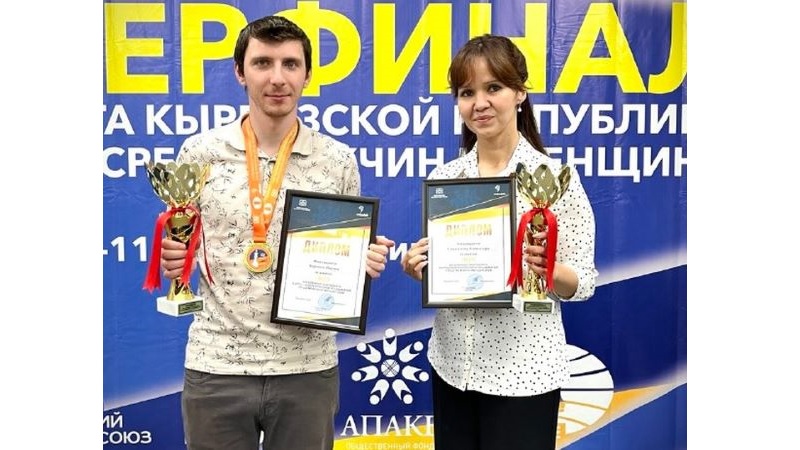
The Open and Women’s Kyrgyzstan Championships 2024 organized by the Kyrgyz Chess Union took place from May 1 to May 11 in the conference hall of the Kyrgyz Chess Union’s office. Both tournaments, 12-player round-robins with classical time control, were held under the supervision of International Arbiter Nurdin uulu Sardarbek. IM Nikita Khoroshev, with his exceptional performance, clinched the title in the open event. He scored an impressive 8.5 out of 11, including crucial victories over his main rivals, securing his top spot in the final standings. IM Asylbek Abdyzhapar and FM Eldiiar Orozbaev gave the champion a good run for his money, finishing a half-point behind him and tying for second place. Abdyzhapar claimed the silver due to a better Sonneborn-Berger, while Orozbaev settled for the bronze. Final standings Open 1 IM Khoroshev, Nikita 2352 8½ 2 IM Abdyzhapar, Asylbek 2353 8 3 FM Orozbaev, Eldiar 2379 8 4 IM Markov, Mikhail 2283 7½ 5 FM Zhakshylykov, Erzhan 2242 7 6 IM Tologon Tegin, Semetei 2347 6½ 7 FM Sezdbekov, Ruslan 2283 5 8 FM Maznitsin, Andrei 2164 4½ 9 NM Umarbekov, Aziz 2095 3½ 10 CM Sharshenbekov, Emir 2020 3½ 11 Kurbanbaev, Zalkar 1885 3 12 NM Esenbek Uulu, Ilimbek 2007 1 WFM Alexandra Samaganova (pictured below) dominated the women’s section, scoring 8.5/11 and finishing a full point ahead of WCM Begimay Zhanybekova and Asel Lesbekova. It is her fifth national title. Zhanybekova and Lesbekova tied for second place, netting 7.5/11, with the former taking silver as the winner of their direct encounter. Final standings Women 1 WFM Samaganova, Aleksandra 1915 8½ 2 WCM Zhanybekova, Begimay 1902 7½ 3 WCM Lesbekova, Assel 1880 7½ 4 WCM Sezdbekova, Aizhan 1869 7½ 5 WCM Abaeva, Aiana 1800 6½ 6 WMK Zhunusbekova, Aimonchok 1788 6 7 WFM Sovetbekova, Nurai 1961 5 8 Tursunalieva, Nurelina 1743 4 9 WMK Bekbasarova, Nurnisa 1720 4 10 WNM Omurbekova, Diana 1810 3½ 11 WFM Zairbek Kyzy, Begimai 1916 3½ 12 Sabyrbekova, Aizhan 1622 2½ Photos: Kyrgyz Chess Union

